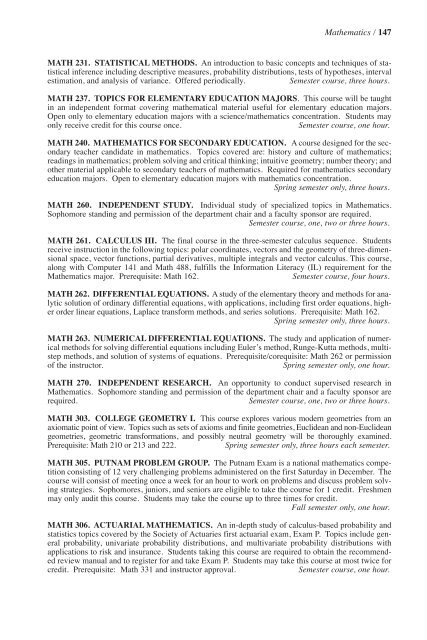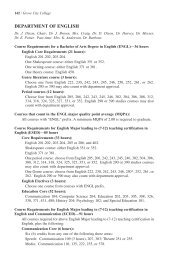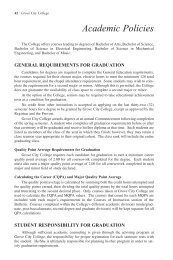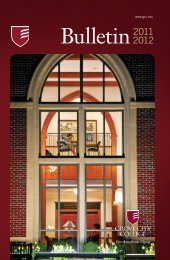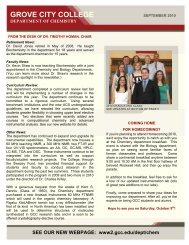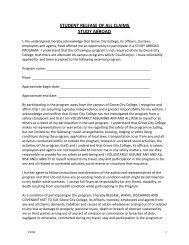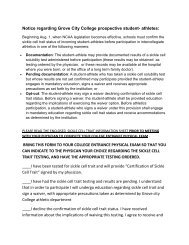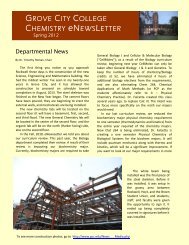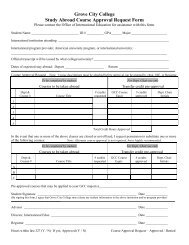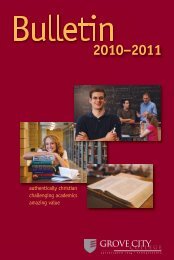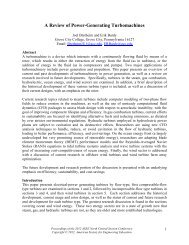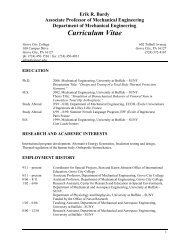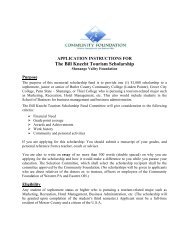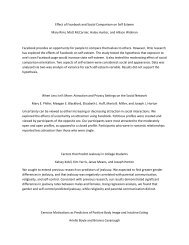2009–2010 - Grove City College
2009–2010 - Grove City College
2009–2010 - Grove City College
Create successful ePaper yourself
Turn your PDF publications into a flip-book with our unique Google optimized e-Paper software.
Mathematics / 147<br />
MATH 231. STATISTICAL METHODS. An introduction to basic concepts and techniques of statistical<br />
inference including descriptive measures, probability distributions, tests of hypotheses, interval<br />
estimation, and analysis of variance. Offered periodically. Semester course, three hours.<br />
MATH 237. TOPICS FOR ELEMENTARY EDUCATION MAJORS. This course will be taught<br />
in an independent format covering mathematical material useful for elementary education majors.<br />
Open only to elementary education majors with a science/mathematics concentration. Students may<br />
only receive credit for this course once. Semester course, one hour.<br />
MATH 240. MATHEMATICS FOR SECONDARY EDUCATION. A course designed for the secondary<br />
teacher candidate in mathematics. Topics covered are: history and culture of mathematics;<br />
readings in mathematics; problem solving and critical thinking; intuitive geometry; number theory; and<br />
other material applicable to secondary teachers of mathematics. Required for mathematics secondary<br />
education majors. Open to elementary education majors with mathematics concentration.<br />
Spring semester only, three hours.<br />
MATH 260. INDEPENDENT STUDY. Individual study of specialized topics in Mathematics.<br />
Sophomore standing and permission of the department chair and a faculty sponsor are required.<br />
Semester course, one, two or three hours.<br />
MATH 261. CALCULUS III. The final course in the three-semester calculus sequence. Students<br />
receive instruction in the following topics: polar coordinates, vectors and the geometry of three-dimensional<br />
space, vector functions, partial derivatives, multiple integrals and vector calculus. This course,<br />
along with Computer 141 and Math 488, fulfills the Information Literacy (IL) requirement for the<br />
Mathematics major. Prerequisite: Math 162. Semester course, four hours.<br />
MATH 262. DIFFERENTIAL EQUATIONS. A study of the elementary theory and methods for analytic<br />
solution of ordinary differential equations, with applications, including first order equations, higher<br />
order linear equations, Laplace transform methods, and series solutions. Prerequisite: Math 162.<br />
Spring semester only, three hours.<br />
MATH 263. NUMERICAL DIFFERENTIAL EQUATIONS. The study and application of numerical<br />
methods for solving differential equations including Euler’s method, Runge-Kutta methods, multistep<br />
methods, and solution of systems of equations. Prerequisite/corequisite: Math 262 or permission<br />
of the instructor. Spring semester only, one hour.<br />
MATH 270. INDEPENDENT RESEARCH. An opportunity to conduct supervised research in<br />
Mathematics. Sophomore standing and permission of the department chair and a faculty sponsor are<br />
required. Semester course, one, two or three hours.<br />
MATH 303. COLLEGE GEOMETRY I. This course explores various modern geometries from an<br />
axiomatic point of view. Topics such as sets of axioms and finite geometries, Euclidean and non-Euclidean<br />
geometries, geometric transformations, and possibly neutral geometry will be thoroughly examined.<br />
Prerequisite: Math 210 or 213 and 222. Spring semester only, three hours each semester.<br />
MATH 305. PUTNAM PROBLEM GROUP. The Putnam Exam is a national mathematics competition<br />
consisting of 12 very challenging problems administered on the first Saturday in December. The<br />
course will consist of meeting once a week for an hour to work on problems and discuss problem solving<br />
strategies. Sophomores, juniors, and seniors are eligible to take the course for 1 credit. Freshmen<br />
may only audit this course. Students may take the course up to three times for credit.<br />
Fall semester only, one hour.<br />
MATH 306. ACTUARIAL MATHEMATICS. An in-depth study of calculus-based probability and<br />
statistics topics covered by the Society of Actuaries first actuarial exam, Exam P. Topics include general<br />
probability, univariate probability distributions, and multivariate probability distributions with<br />
applications to risk and insurance. Students taking this course are required to obtain the recommended<br />
review manual and to register for and take Exam P. Students may take this course at most twice for<br />
credit. Prerequisite: Math 331 and instructor approval. Semester course, one hour.


